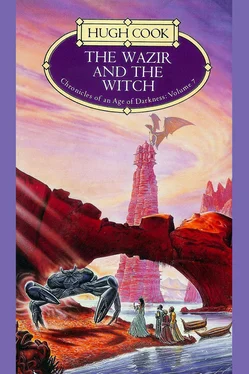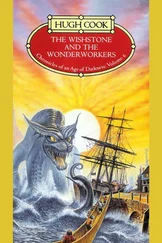Hugh Cook - The Wazir and the Witch
Здесь есть возможность читать онлайн «Hugh Cook - The Wazir and the Witch» весь текст электронной книги совершенно бесплатно (целиком полную версию без сокращений). В некоторых случаях можно слушать аудио, скачать через торрент в формате fb2 и присутствует краткое содержание. Жанр: Фэнтези, на английском языке. Описание произведения, (предисловие) а так же отзывы посетителей доступны на портале библиотеки ЛибКат.
- Название:The Wazir and the Witch
- Автор:
- Жанр:
- Год:неизвестен
- ISBN:нет данных
- Рейтинг книги:5 / 5. Голосов: 1
-
Избранное:Добавить в избранное
- Отзывы:
-
Ваша оценка:
- 100
- 1
- 2
- 3
- 4
- 5
The Wazir and the Witch: краткое содержание, описание и аннотация
Предлагаем к чтению аннотацию, описание, краткое содержание или предисловие (зависит от того, что написал сам автор книги «The Wazir and the Witch»). Если вы не нашли необходимую информацию о книге — напишите в комментариях, мы постараемся отыскать её.
The Wazir and the Witch — читать онлайн бесплатно полную книгу (весь текст) целиком
Ниже представлен текст книги, разбитый по страницам. Система сохранения места последней прочитанной страницы, позволяет с удобством читать онлайн бесплатно книгу «The Wazir and the Witch», без необходимости каждый раз заново искать на чём Вы остановились. Поставьте закладку, и сможете в любой момент перейти на страницу, на которой закончили чтение.
Интервал:
Закладка:
By combining the two theses outlined directly above, we arrive at a potent political proposition; which is, that the people of a nation can be more easily motivated and manipulated by offering them the destructive but all too realistic freedom to oppress than by trying to tempt them with the ghostly visions of that creative liberty vouchsafed by freedom from oppression.
This means that practical politics ever inclines toward hate; and oppression; and war. Thus it happens that, in my own homeland, everyone knows what they are against; and what they actively support is usually a list of proposed suppressions, oppressions, fines, censorships, banishments, outlawings, whippings, floggings, birch-ings, curfews and compulsions. As it is in Quilth, so it is elsewhere; and so we live in an age of darkness where the highest expression of civilization is the act of destruction.
Unfortunately, the Empress Justina was not given to those wraths and hates, those destructions and oppressions, which might well have united the greater part of her people under her rule. She had for instance stopped the pogrom against the Ebrell Islanders; which had won her great unpopularity in many quarters.
Instead of ruling by conventional means, Justina had chosen to exercise mercy and justice; and, in the long run, public discipline had not suffered thereby. In particular, Justina had found the judicious exercise of the prerogative of mercy to be an instrument of statecraft equally as valuable as the executioner’s axe; and she was rightly proud of her achievement. In the lustrum following her father’s incarceration, she had given her people the fullest possible margin of creative liberty; but, instead of uniting her people in love, this policy had led to Justina being hated and feared, particularly by established Religions.
One of those privileges which Religions demand (and an unfortunate fact is that ideologies in declared opposition to Religion soon become Religions in their own right, regardless of their blasphemous contempt for the gods and the worshippers of the same) is the right to oppress. This is seen in the historian’s homeland, where a Religion demands the exclusive right to instruct the young in the management of their sexuality, proceeding in total disregard of the disasters its fatuous advice has produced down through the decades.
On Untunchilamon, the Religion of Zoz the Ancestral demanded far, far more, both on its own behalf and on behalf of the closely associated Temple of Torture.
Hence Justina must necessarily die, for her love has doomed her.
This polemic being at an end, and the lovemaking of the Princess Sabitha being similarly concluded, and Shabble being well launched into a disquisition upon contraceptive technique (technique which law compels us to pass over in silence), we will now proceed elsewhere (this history thus becoming yet another of the many victims of censorship). But before we depart from the Xtokobrokotok, we have time (not much, but a little) for a quick glance at the deity worshipped by the Cult of the Holy Cockroach. A living Presence, this; hence His existence can be proved by pointing in the right direction and declaring a self-evident truth, which is that:
‘There He is!’
In His wickerwork cage, the Cockroach stirs. Already He is huge, a handspan in length at least; but He will grow larger yet if the adoration of His congregation continues, for offerings are brought to the warehouse daily for His delectation. There is cheese made from the milk of goats; and that far rarer and enormously expensive cheese made (in small quantities, and only for the most dedicated of connoisseurs) from the milk of monkeys. There are mangos, bits of baked banana frog, chunks of well-cooked taro and fractions of sugar cane; and on all this He feeds as He sees fit.
Elsewhere, in the pink palace (we have, you see, departed from Xtokobrokotok, have ghosted up Goldhammer Rise, have sped up Lak Street with a speed which draws its inspiration from lightning’s example, and have penetrated the walls of the palace like so many ghosts) Justina Thrug is unsoundly asleep.
Up from the depths of Moana mounts a tsunami, rising to a crescendous crest which seemed for a moment to stall before it fell. Then fall it does, breaking into a roar of dragon-outdoing wrath which plunges across the Outer Reef, shocking the sands of Scimitar with its onslaught. On it plunges, sweeping across Jod, demolishing the white marble of the Analytical Institute, then lunging across the Laitemata to earthquake into the streets of Injiltaprajura.
Screams thrash in moilstorm waters.
Then the tsunami is retreating in flurries of foaming red, the colour supplied by churned sand, crushed coral and shattered bloodstone, and by more than a little of that precious ichor which flows in the veins of human beings. It is retreating, and leaving behind it broken rags, wet bones and gasping teeth.
Thus Justina’s dream.
Shocked by a lathering of wet water, she abrupts from sleep, gasps for air, claws, grasps, wrenches, pulls.
Her mosquito net collapses around her, downfolding in whispers softer than silk, caresses lighter than a lover’s touch. Justina lies beneath its web.
Waits.
Listens.
There is no water.
There is no wave.
It was all her dream.
At length, she falls to sleep again, and dreams this time of Wen Endex. She stands in the swamplands with an orking harpoon in her hands, waiting for her quarry. A dream of the past, this, for no orking has taken place in Justina’s lifetime. The most solemn treaties now bind orks and Yudonic Knights in common cause. Yet Justina dreams of ork blubber. Rich, fat and nuggety. Most princely of feasts.
Then wakes.
It is dawn.
CHAPTER TWENTY-ONE
Justina Thrug woke from unabashed dreams of orking, of lusty slaughter and rapturous feasting. She experienced a momentary guilt, for these were dreams of the Forbidden. Orking was the great racial crime of the children of Wen Endex. In their lust for blood, bone and blubber, the Yudonic Knights and their legions of underlings had exterminated every ork in the swamplands of their homeland. Such wholehearted murder had bloated Galsh Ebrek with treasure; had overloaded the coffers of the Flesh Traders’ Financial Association until those coffers screamed in protest; had made the Homeland so rich in its debauchery that in one memorable year it imported (a record, this, at least for the region) a full seven previously unrecorded venereal diseases.
The swamp-whales had barely escaped extinction; the poor orks only survived as a breed thanks to the foresight of those of their kind who had fled to refuges in the Qinjoks. At that time, when the orks had been so over-hunted that there was no commercial advantage to be gained from their further exploitation, the Yudonic Knights at last sent their ambassadors to this persecuted people and made a peace.
A peace which the orks trusted not, in token of which mistrust they rigorously practised contraception, lest an increase in their population tempt the very temptable Yudonic Knights to a feat of collective oathbreaking and untrammelled genocide.
Thus Justina woke and felt guilty. But guilt was brief though waking was long; for the Empress Justina was far too busy to spare much thought for the horrors of the past. Untunchilamon stood unchanged. Another hot and sultry day was begun. A day bereft of wind: something all Injiltaprajura would lament, for lack of wind would further delay the rest of the Trade Fleet.
The lordess of the pink palace began that day’s work by ascending early to the roof of her pink palace to inspect Sken-Pitilkin’s airship. She was pleased to see the elderly wizard was already at work. Reconstruction of his scattered ship was going apace. But Justina nevertheless had a measure of displeasure to express.
Читать дальшеИнтервал:
Закладка:
Похожие книги на «The Wazir and the Witch»
Представляем Вашему вниманию похожие книги на «The Wazir and the Witch» списком для выбора. Мы отобрали схожую по названию и смыслу литературу в надежде предоставить читателям больше вариантов отыскать новые, интересные, ещё непрочитанные произведения.
Обсуждение, отзывы о книге «The Wazir and the Witch» и просто собственные мнения читателей. Оставьте ваши комментарии, напишите, что Вы думаете о произведении, его смысле или главных героях. Укажите что конкретно понравилось, а что нет, и почему Вы так считаете.












